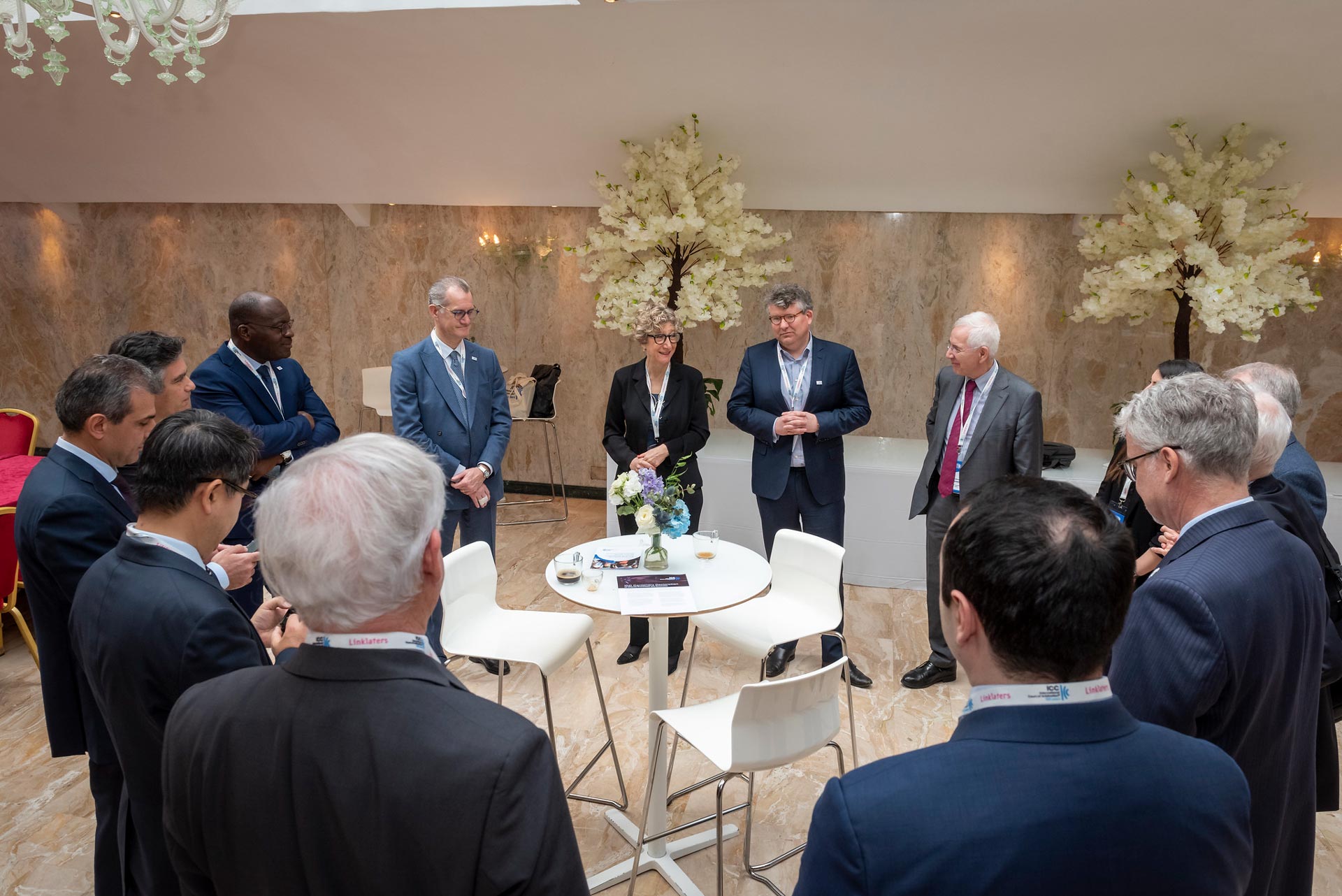Centenary of the ICC Court
In 2023, we have celebrated 100 years of the ICC International Court of Arbitration®, the world’s leading arbitral institution. Since the inception of the ICC Court in 1923, we have remained at the forefront of supporting global trade and investment through dispute prevention and resolution.
As we celebrate a century of service, we are taking this opportune time in our history to reflect on our pioneering dispute resolution journey, through challenges and milestone achievements. Most importantly we are recommitting to the purpose of the ICC Court to promote access to justice and the rule of law, and to shaping the future of dispute resolution for generations to come.
Origins and history
ICC was created in 1919 by the French Minister of Commerce, Etienne Clementel along with a handful of entrepreneurs who called themselves the “Merchants of Peace”. They fervently believed that strong and mutually beneficial ties among nations through trade, industry and commerce would not only make nations prosperous but also make them less likely to go to war.
The need for an international dispute resolving mechanism became apparent to meet the rise in international trade and investment.
In May 1922, the ICC Executive Committee approved the creation of an international court for commercial disputes and the ICC Court of Commercial Arbitration was inaugurated on 19 January 1923.
From our post-war beginnings, the central tenet of the ICC Court has been the belief that trust in an independent, neutral and robust dispute resolution process, free from political dynamics, is key to encouraging trade and investment across borders.
ICC Court milestones
1920 ICC Constitution and Commission on Arbitration created (later renamed Commission of Arbitration and ADR)
1922 The first ICC Rules of Arbitration promulgated (subsequent versions published in 1927, 1955, 1975, 1988, 1998, 2012, 2017 and 2021)
1923 ICC Court inauguration meeting and first case submitted
1927 ICC helps broker The Geneva Convention on the Execution of Foreign Arbitral Awards
1953 ICC submits the Preliminary Draft Convention of The New York Arbitration Convention on the Recognition and Enforcement of Foreign Arbitral Awards
1976 ICC International Centre for ADR established
1979 ICC Institute of World Business Law established
1980’s Introduction of more advanced arbitration clauses
1995 Party representation from South and Far East Asia exceeds North America for the first time
1996 The number of parties from Western Europe represents less than 50% of all parties
2008 The opening of the case management office in Hong Kong
2014 The ICC Court opens new case management office in North America in New York
2018 The opening of the case management office in Sao Paulo, Brazil and in Singapore
2018 ICC Court achieves full gender parity
2021 The opening of the case management office in Abu Dhabi, UAE
2021 The election of the first woman as President of ICC Court
2021 ICC arbitral awards made available, free of charge, to the global legal community via Jus Mundi
2022 ICC reaches major arbitration milestone with 27,000th case
2023 Centenary of the ICC Court, ICC Declaration on Dispute Prevention and Resolution issued
The ICC Centenary Declaration on Dispute Prevention and Resolution
On 19 January 2023, the ICC Court issued the ICC Centenary Declaration on Dispute Prevention and Resolution, setting out a vision to shape the future of dispute resolution and prevention for the next century.
Setting out guiding principles for a forward looking framework to drive dispute resolution and prevention of the future, the Centenary Declaration mirrors the pioneering vision of our ICC founders.
The Declaration is issued on behalf of ICC and our network communities worldwide, following rich and inclusive discussions of our strategic priorities, challenges and opportunities. It states:
‘’As the nature and character of business relationships and disputes evolve in an ever-changing world, ICC’s track record of continual innovation places it in the perfect position to lead dispute prevention and resolution into the future.”
The ICC International Court of Arbitration will shape the future of dispute prevention and resolution by:
- Ensuring access to justice and the rule of law
- Providing an independent and neutral dispute prevention and resolution process
- Driving thought leadership in dispute prevention and resolution through innovative services
- Increasing the global reach of arbitration and ADR
- Improving transparency in the dispute prevention and resolution process
- Providing training and capacity building to strengthen disputes infrastructure globally
- Leading the transformation of dispute prevention and resolution
- Building on our cutting-edge work on diversity, equity and inclusion in all aspects of dispute prevention and resolution
- Adopting sustainability measures to minimise our own environmental footprint
- Working across ICC and in partnership with like-minded organisations and individuals globally
Who are the ICC Court Members?
Members of the ICC Court are appointed for three-year terms by the World Council. This is done on the proposal of one member from ICC national committees and other ICC groups, or upon proposal by the President of the Court.
Once appointed, ICC Court members must remain independent from national committees in the performance of their functions. Alternate members are appointed by the World Council on the proposal of the ICC Court’s President.
All Court Members, including President and Vice-Presidents, Members and alternate Members, effective as of 1 July 2021, can be viewed here. (*Alternate Members are those with an asterisk next to their name)

ICC Court Alumni
All former members of the ICC International Court of Arbitration, are able to remain engaged in our work as a member of the ICC Court Alumni Group. Alumni members support ICC’s commitment to investing in and innovating ICC’s world-leading arbitral process.
ICC Court President and Past Presidents
Claudia Salomon
2021 – present
Claudia Salomon made history when she became the first woman President of the ICC Court. Since taking on the role Ms Salomon has demonstrated a commitment to ensuring a client-focused mindset as well as greater inclusivity and diversity in arbitration globally.
Alexis Mourre
2015 – 2021
Alexis Mourre’s approach to reforming the ICC Court was based on five pillars: efficiency, transparency, ethics, diversity, and “glocalism” – to safeguard the legitimacy of international arbitration. Mr Mourre not only paved the way for ICC to tackle the challenges of legitimacy in arbitration, but also pioneered a vision and foundation for the ICC Court to be the bedrock of a modern and diverse approach to arbitration.
John Beechey
2009 – 2015
John Beechey spearheaded reforms aimed at enhancing the efficiency, integrity and effectiveness of the arbitration process. Under his leadership, ICC published new Rules of Arbitration.
Carl Salans
2008
Carl Salans stepped in as interim chair at a time when ICC was undergoing a sudden change in leadership, leading the organisation towards stability and growth.
Pierre Tercier
2006 – 2008
Pierre Tercier was a visionary who wanted to bolster the role of the ICC Court within the structure of ICC. He promoted a more widespread and international approach to the role of ICC and under his guidance the presence of the ICC in Asia grew considerably.
Robert Briner
1997 – 2006
Under Robert Briner’s presidency, the ICC Court saw an exceptional expansion worldwide. The creation of almost 30 national committees including a regional office in Asia, together with a more global and heterogeneous ICC Court caseload were boosted by Mr Briner’s enthusiasm and professionalism. His commitment and authority were exemplified during the implementation of new ICC Rules of Arbitration and the daily practices of the ICC Court.
Alain Plantey
1988 – 1996
Alain Plantey established and expanded regional consultative groups on arbitration in Arab countries, Asia and the Pacific, Latin America and Europe. He was the creator of the ICC documentation centre, which includes publications such as the ICC Arbitration Court Bulletin. As a forward-thinking president, he was the pioneer of a computerised management system of the ICC Court’s caseload. He laid the foundations for the future of the ICC Court of Arbitration, which became International, including by name, at his behest.
Michel Gaudet
1977 – 1988
Michel Gaudet provided the ICC Court with new bodies and powers suitable for the increasingly important role the ICC Court was gaining worldwide: the introduction of a Committee of the Court, with decisive powers on behalf of the ICC Court between Plenary Sessions, and the introduction of the ICC Court Deputy Secretary General.
Jean Rey
1975 – 1977
Jean Rey was a lawyer and Belgian politician. He served as the President of the European Commission from 1967 to 1970, before his tenure as President of the ICC Court. Picture : Marcelle Jamar, Attribution, via Wikimedia Commons
Edwin Herbert
1970 – 1975
Sir Edwin Herbert completely altered the arbitration landscape, highlighting how the system – established under the 1927 Geneva Convention – no longer corresponded to the requirements of international trade. As such, he spearheaded the effort to develop a new mechanism for the enforcement of arbitral awards.
Albot Bagge
1939 – 1945
Against the background of the upheaval of the world order, during World War II, Albot Bagge had one of the most challenging tenures to keep the flame of arbitration alive. Temporarily homed in Stockholm under the leadership of Albot Bagge, the ICC Court had a unique role to play. Under the leadership of Bagge, ICC cemented its approach on neutrality, despite the hostile atmosphere surrounding it. Picture : Pot, Harry / Nationaal Archief – AnefoCrop: Groupsixty, CC0, via Wikimedia Commons
Nicolas Politis
1935 – 1938
Nicolas Politis was a prominent Greek international lawyer and diplomat. He was one of the first scholars to contribute to the literature on arbitration. His seminal works include the Receuil des arbitrages internationaux (Reports of International Arbitral Awards), published together with professor A. De Lapradelle, and La justice international (International justice).
Etienne Clementel
1923 – 1935
The French politician Etienne Clementel was the first President of the ICC Court. He served as Minister several times in a range of offices but it was in 1915 that he became Minister of Commerce. Mr Clementel’s work was a founding and significant milestone in ICC’s history and in particular of the ICC Court.

ICC Court Centenary sponsorship and partnership opportunities
Want to be part of the ICC Court Centenary celebration? If you are interested in supporting us, learn more about the available opportunities in our sponsorship presentation here.
This is your exclusive invitation to bolster your organisation’s profile, in partnership with ICC Dispute Resolution Services, during our ICC Court Centenary programme of events and activities throughout 2023.
